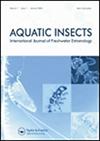Exposure of cold-adapted Diamesa mendotae Muttkowski, 1915 (Diptera: Chironomidae) to short-term high temperature reduces longevity and reproduction
IF 0.5
4区 农林科学
Q4 ENTOMOLOGY
引用次数: 0
Abstract
Abstract Climate change is increasing mean winter temperatures and the frequency of short-term high temperatures. Winter-emerging aquatic insects require an extended cold period to develop and may be negatively impacted by high winter air temperatures. Diamesa mendotae Muttkowski, 1915 is a cold-adapted, winter-emerging chironomid common in groundwater-dominated streams in Minnesota. Previous studies have found constant exposure to high air temperatures reduced adult D. mendotae survivorship, but not how short-term high temperature exposure may affect D. mendotae survivorship and reproduction. We found short-term exposure (24 or 48h) to 22 °C decreased adult D. mendotae longevity and reduced egg laying and larval hatch success, which may reduce future D. mendotae population sizes. Disruptions in D. mendotae and other cold-adapted insect populations may have broad ramifications for groundwater-fed stream ecosystems. Our study highlights the need for further research on cold-adapted insect survivorship after short-term winter temperature spikes to understand impacts of climate change beyond mean annual temperature increases.低温适应性门尾蝶,1915(双翅目:手蛾科)暴露于短期高温会降低寿命和繁殖能力
本文章由计算机程序翻译,如有差异,请以英文原文为准。
求助全文
约1分钟内获得全文
求助全文
来源期刊

Aquatic Insects
生物-昆虫学
CiteScore
2.00
自引率
25.00%
发文量
27
审稿时长
>12 weeks
期刊介绍:
Aquatic Insects is an international journal publishing original research on the systematics, biology, and ecology of aquatic and semi-aquatic insects.
The subject of the research is aquatic and semi-aquatic insects, comprising taxa of four primary orders, the Ephemeroptera, Odonata, Plecoptera, and Trichoptera but also aquatic and semi-aquatic families of Hemiptera, Coleoptera, and Diptera, as well as specific representatives of Hymenoptera , Lepidoptera, Mecoptera, Megaloptera , and Neuroptera that occur in lotic and lentic habitats during part of their life cycle. Studies on other aquatic Hexapoda (i.e., Collembola) will be only accepted if space permits. Papers on other aquatic Arthropoda (e.g., Crustacea) will not be considered, except for those closely related to aquatic and semi-aquatic insects (e.g., water mites as insect parasites).
The topic of the research may include a wide range of biological fields. Taxonomic revisions and descriptions of individual species will be accepted especially if additional information is included on habitat preferences, species co-existing, behavior, phenology, collecting methods, etc., that are of general interest to an international readership. Descriptions based on single specimens are discouraged.
Detailed studies on morphology, physiology, behavior, and phenology of aquatic insects in all stadia of their life cycle are welcome as well as the papers with molecular and phylogenetic analyses, especially if they discuss evolutionary processes of the biological, ecological, and faunistic formation of the group.
 求助内容:
求助内容: 应助结果提醒方式:
应助结果提醒方式:


